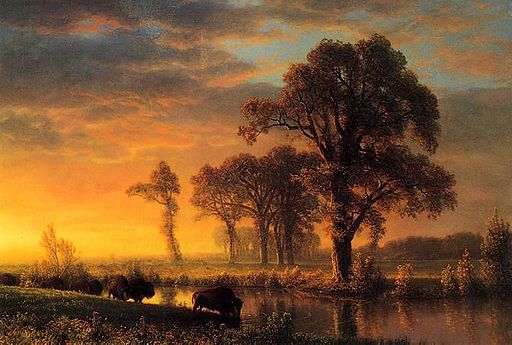 |
A formation of cavalry troops at Carlisle Barracks, April 1861
Photographer: Charles Lochman.
The original of this image is held in the Cumberland County Historical Society in Carlisle, Pennsylvania. |
Update: For Love's side, see part of his
1851 complaint here.
In a
previous post
we showed how the popularity of "Human Destiny" pontificators really
annoyed the narrator of Scenes Beyond the Western Border, and Herman
Melville--at about the same time, and just when Orville Dewey was
wowing New York crowds in January and February 1852 with his popular lecture series on
"The Problem of Human Destiny."
To get at this another way, we might ask, what was Philip St George Cooke doing during the writing of this:
C. "But even science is at fault—philosophy at a discount. The public mind is occupied with the theorism
of demagogues and infidels, who, abandoning themselves to licentious
speculations on human destiny, attract multitudes of fanatical
followers, whose minds they bewilder, and whose morals they debase." (June 1852; and Scenes and Adventures in the Army)
In
early 1852 Cooke was still commander of the post at
Carlisle Barracks,
Pennsylvania, in charge of recruiting for cavalry service and training
new recruits. Biographer Otis E. Young could only guess at Cooke's daily
activities:
"In the absence of his
diaries, only conjecture can supply the details of Major Cooke's life
during his stay at Carlisle Barracks." (The West of Philip St George Cooke p243)
However, with records from the National
Archives now conveniently accessible through Fold3, a good deal more can
now be said. In 1852 alone Cooke wrote at least 47 letters to the
Adjutant General. Letters from Cooke to the AGO show one thing Cooke
was definitely doing at Carlisle Barracks in January and February 1852,
and that is feuding with
John Love (1820-1881). The
Indiana Historical Society holds a collection of
John Love Papers which I have not yet seen, as does the
University of Michigan, but documents in the National Archives tell Cooke's side of the story.
On February 8, 1852 Cooke confided:
his [John Love's] coming here on the 17th January—without
authority—and failing in his duty to report to me, was it appears, the second
time he has done the same thing. His
conduct now—whether to have cause of complaint or not—is a defiance of legal
orders and authority.
I strive to maintain discipline; but do so with all kindness
& courtesy until it is repelled, & misunderstood; but I cannot maintain
discipline, and respect—my own respect—for my station, if this officer is
sustained in his course. Consequently,
under par. 757 of the regulations, I report that the good of the service
demands that Capt. Love be sent to his company.
On
Valentine's Day 1852, Cooke forwarded to the AGO with his January
accounts, a letter he had written Love at the recruiting station in
Harrisburg on February 12, 1852:
Sir,
I have just received back your monthly return for January
uncorrected; you say you “can find no error” in it.
I have your December return before me which you sent to me
wrong; not making “transferred to principal Depot,” the seven men which came
here “December 18th & 31st.
I returned it for correction and it came back with that error corrected,
and reads, “1, total of parties and recruits present & absent.” …I had to write to you January 7th
to correct still another error, viz: “Insert in your retained copy of your
monthly return 1 “joined from General Depot, and it will then be
complete.” This showed plainly that I
not only took pains to instruct you to make the return right, but to inform you
of your duty to keep a correct office copy.
Now, in the uncorrected January return, you report that “Total of parties
& recruits last return,” 8: that
return says, “1”;-- The January Return gives your num comm'd per party “2,” &
disposable recurits "1"; these form, of course, your “total of parties &
recruits”; well, 2 & 1 make 3, but you report “6.” Now could you not find out these errors?
All this confusion arose in the enlisting and sending off but eleven men, & in about six weeks, an account which it seems to me, you could
have kept without the assistance of pen and paper.
But, I sent back your January return with the usual sum (in
addition and substraction) of proof, plainly marked in pencil: thus,
8
4
1
13
3
10
This I thought would indicate to you at least one error;
viz. that according to your return you had 10 total of parties & recruits
to account for, instead of 6, as you have it.
But it appears the Adjutant General thought the error of your report
“apparent on its face,” without the assistance of these significant pencil
marks, for it shows, they have been rubbed off.
I trust that now, you will be able to send me a correct
return for January. The errors were so
palpable to me, that I did not think it necessary to point them out at first
more particularly than I did; if you had asked me, I would with pleasure have
given you all this information; & with our close vicinity, a correct
return could, long ago, have been received; but, even now you do not ask to
have the errors pointed out, but report that you cannot find them.
I cannot possibly grant the leave of absence you have asked, until this duty be satisfactorily performed.
I am sir,
Respectfully,
Yr. ob't serv't
P St Geo Cooke
Maj. 2nd Drag[oon]s B[revet] Lt Col.
Superintendent
Below, a link to the page from the February 12, 1852 letter at
fold3.com Check it out and see the pains Cooke takes to correct Love's arithmetic:
Page 5
















